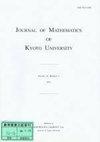泊松随机测度泛函的渐近展开式
Q2 Mathematics
引用次数: 7
摘要
泊松随机测度泛函的Malliavin演算已被许多作者提出。Bismut[2]利用Girsanov定理推广了Wiener-Poisson泛函的Malliavin演算。作为另一种方法,在Bichteler, Gravereaux和Jacod[1]中,可以找到对Wiener-Poisson空间上的Malliavin算子的研究及其在随机微分方程中的应用。在这两部著作中,作者都给出了维纳-泊松空间上的微分算子,并证明了分部积分公式。这些公式在强度测量上有一定的限制,即强度测量必须具有光滑的密度。另一方面,在维纳泛函的Malliavin演算中,平方可积维纳泛函空间的维纳混沌展开可以看作是一个Fock空间,微分算子可以看作是一个Fock空间上的湮灭算子。这种结构也可以在维纳-泊松空间的平方可积泛函空间中找到,见[6]。Nualart和Vives[10],[11]和Picard[13]研究了泊松随机测度的平方可积泛函空间上的湮灭算子及其对偶算子(生成算子)。Picard[12]还利用对偶公式(见定理2.1)给出了强度测度条件1(见第2节)下泊松随机测度泛函的光滑性判据,并研究了一些随机微分方程的解。Picard的这个论证可以推广到一些Wiener-Poisson泛函,见[5]。条件1不同于[1],它允许我们取一个有奇点的强度测量。我们可以找到一些满足条件1的有趣例子,例如稳定过程和CGMY过程(参见[3])。本文的目的是证明一个泊松随机测度泛函的渐近展开定理(由Watanabe[18]在Wiener空间中完成)。利用上面提到的Malliavin算子,Sakamoto和Yoshida[15]研究了一些方程的渐近展开公式本文章由计算机程序翻译,如有差异,请以英文原文为准。
Asymptotic expansions for functionals of a Poisson random measure
The Malliavin calculus for functionals of a Poisson random measure has been developed by many authors. Bismut [2] has generalized the Malliavin calculus for Wiener-Poisson functionals by using the Girsanov theorem. As another method, in Bichteler, Gravereaux and Jacod [1], one can find the study of the Malliavin operator on Wiener-Poisson space and application of it to stochastic differential equations. Both in these works, the authors have given differential operators on Wiener-Poisson space and have proved the integration by parts formulas. These formulation suffers some limitation on an intensity measure, that is, the intensity measure must have a smooth density. On the other hand, in the Malliavin calculus for Wiener functionals, Wiener chaos expansion of the space of square integrable Wiener functionals can be considered as a Fock space, and the differential operator is regarded as the annihilation operator on a Fock space. This sort of structure can be also found in the case of the space of square integrable functionals of Wiener-Poisson space, see [6]. Nualart and Vives [10], [11], and Picard [13] have studied the annihilation operator and its dual operator (the creation operator) on the space of square integrable functionals of a Poisson random measure. Picard [12] has also given a smoothness criterion by using the duality formula (see Theorem 2.1) for functionals of a Poisson random measure under the Condition 1 (see Section 2) on the intensity measure, and has studied the solution to some stochastic differential equation. This argument of Picard can be generalized for some Wiener-Poisson functionals, see [5]. The Condition 1 differs from that of [1], and allows us to take a intensity measure with some singularity. One can find some interesting examples satisfying Condition 1, for instance, stable processes and CGMY processes (see [3]). The purpose of this paper is to prove the asymptotic expansion theorem (done in the Wiener space by Watanabe [18]) for functionals of a Poisson random measure. By using the Malliavin operator which we mentioned above, Sakamoto and Yoshida [15] have studied asymptotic expansion formulas of some
求助全文
通过发布文献求助,成功后即可免费获取论文全文。
去求助
来源期刊
CiteScore
1.20
自引率
0.00%
发文量
0
期刊介绍:
Papers on pure and applied mathematics intended for publication in the Kyoto Journal of Mathematics should be written in English, French, or German. Submission of a paper acknowledges that the paper is original and is not submitted elsewhere.

 求助内容:
求助内容: 应助结果提醒方式:
应助结果提醒方式:


